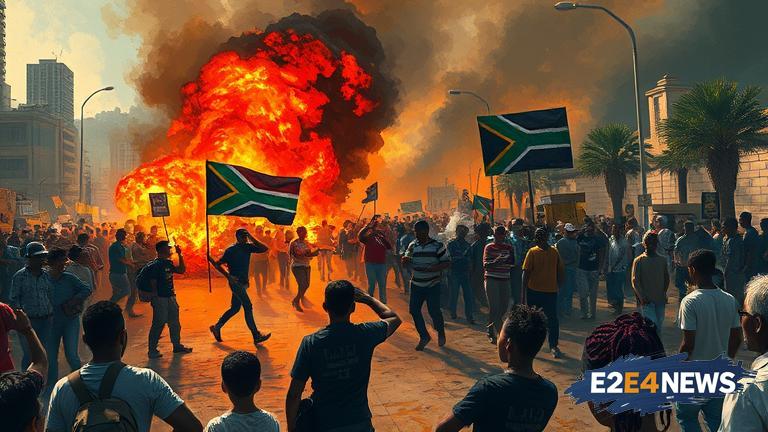South Africa has been plagued by violent protests and unrest, with reports of looting, arson, and clashes between police and demonstrators. The situation has been escalating over the past few days, with the country’s major cities being affected. The protests are believed to have been sparked by the imprisonment of former President Jacob Zuma, who was sentenced to 15 months in prison for contempt of court. Zuma’s supporters have been calling for his release, and the situation has been fueled by economic hardship and frustration with the government. The violence has resulted in the deaths of at least 72 people, with many more injured. The police and military have been deployed to try and restore order, but the situation remains volatile. The protests have also had a significant impact on the country’s economy, with many businesses being forced to close and supply chains being disrupted. The government has appealed for calm and has promised to address the underlying issues that have led to the unrest. However, the situation remains tense, and it is unclear when the violence will subside. The international community has been watching the situation with concern, and there have been calls for restraint and dialogue. The African Union has issued a statement calling for calm and urging the government and protesters to engage in dialogue. The United States has also issued a statement, expressing concern about the violence and urging all parties to work towards a peaceful resolution. The European Union has also called for calm and restraint, and has offered support to the South African government. The situation in South Africa is a reminder of the ongoing challenges faced by the country, including high levels of unemployment, poverty, and inequality. The government has been struggling to address these issues, and the protests are a manifestation of the frustration and desperation felt by many South Africans. The country’s history of apartheid and colonialism has also contributed to the current situation, with many South Africans still feeling marginalized and excluded from the economy and society. The protests have also highlighted the need for greater investment in education and job creation, as well as the need for more effective governance and leadership. The government has promised to take steps to address these issues, but it remains to be seen whether these promises will be fulfilled. In the meantime, the situation remains volatile, and it is unclear what the future holds for South Africa. The country’s economy is likely to suffer in the short term, and the violence has already had a significant impact on the tourism industry. The international community will be watching the situation closely, and there will be pressure on the government to take decisive action to address the underlying issues. The protests have also raised questions about the role of the police and military in maintaining order, and there have been concerns about human rights abuses. The government has promised to investigate any allegations of misconduct, but it remains to be seen whether those responsible will be held accountable. The situation in South Africa is a complex and multifaceted one, and it will require a comprehensive and sustained response to address the underlying issues. The government, civil society, and the international community will all need to work together to find a solution to the crisis, and to ensure that the country can move forward in a peaceful and stable manner.





